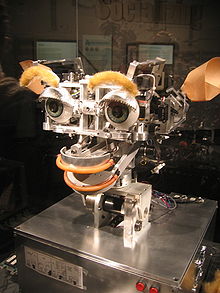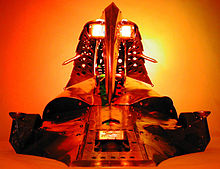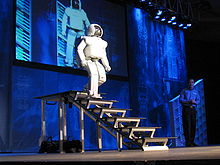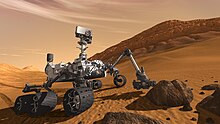Wikipedia:Wikipedia Signpost/2012-09-24/WikiProject report
01010010 01101111 01100010 01101111 01110100 01101001 01100011 01110011




This week, we tinkered with WikiProject Robotics. From the project's inception in December 2007, it has served as Wikipedia's hub for building and improving articles about robots and robotics, accumulating two Featured Articles and seven Good Articles along the way. The project covers both fictitious and real-life robots, the technology that powers them, and many of the brains behind the robotics field. Between improving articles listed in the extensive index of robotics and adding new content to the more stimulating Robotics Portal, there is no shortage of tasks the WikiProject could use help with. We interviewed Chaosdruid and N2e.
What motivated you to join WikiProject Robotics? Do you work on mechanical devices in real life?
- Chaosdruid: I have been interested in robotics since I was a youngster. I had a wide variety of interests, from computing through environmental issues to space exploration, but robotics seems to crop up in all of these areas. I suppose Isaac Asimov was the first real robotics influence in my teens, as I am sure he was for many, when I was reading SF novels. Him and Ray Bradbury led me down a path of realisation that robots were probably one of the things that would greatly affect humanity's future.
- Unfortunately I do not work on them in real life, I am more computer-oriented in my work and personal life. Robotics would have been something I would have loved to have studied, but during my college and University years, in the late 70s/early 80s, the UK was suffering a general lack of interest in funding robotics due to the Lighthill debate and the ensuing lack of funding for AI technology, such as robotics and computing, referred to as the AI winter. I later discovered that there was a small group in Scotland at the University of Edinburgh that managed to progress quite far and kicked myself for not having discovered them when I was due to start Uni.
- N2e: I have been a long-time member of WikiProject Spaceflight, working to improve spaceflight-related articles, and have become more interested in robotic mechanisms on spacecraft as my work has become more involved in developing robotic spacecraft mechanisms for both government and commercial interests. So I am a more recent member of WikiProject Robotics. The overlap between human-initiated spaceflight and robotic-mechanisms, and especially the new commercial spaceflight capabilities and markets that are being, and will be, enabled by this technology is an intersection that should be delved into, and explored, for the benefit of improving Wikipedia articles on both topics. And, yes, I work with mechanical devices in real life: developing and prototyping new and novel robotic mechanisms for use in low-Earth orbit and cislunar space.
The project is home to 2 Featured Articles and 7 Good Articles. Have you contributed to any of these? What are the greatest challenges of preparing a robotics article for FA or GA status?
- Chaosdruid: I have done some work on the Blade Runner page, including a copyedit, but I was mainly tidying up and adding a few refs during an FA review, as it was already an FA when I started getting more involved with Wiki a few years back. Hell is Other Robots I have not been involved with, though both are perhaps seemingly not robotics related, Bender and Blade runner are iconic robotic fiction.
- I have done most of my work in the lesser articles, expanding stubs and creating a few new pages. I have looked at every Robotics project article at least once since I started with the project, but we had a major year long task to assess the unassessed articles first, marking any that need work, and we are now starting to concentrate on expanding articles and getting them improved and restructuring our project categories. Hopefully there will be more GAs soon as we expand and improve the C and B class articles and try to get them promoted to GA and FA.
How much overlap is there between WikiProject Robots and the various projects covering electronics, engineering, and software? Have there been any collaborations between these projects? What are some easy ways that members of related projects can improve robotics articles as part of the work they already do for their own project?
- Chaosdruid: There is a great deal of overlap. Most of the talk pages with a Robotics Project banner also feature other banners - computing, space, technology, and electronics being the main ones. There were collaborations in the past, something I would love to increase in the near future. Many people already improving articles include the robotics related material as they do so. Members of the project who are not-so-active nowadays, and past members, are still robotics fans and do a good job of keeping things up to date - though every little helps and it would be great if people could help by expanding robotics related material if they come across it.
Are some topics in robotics better covered than others on Wikipedia? Are any types or generations of robots neglected? What needs to be done to fill gaps in Wikipedia's coverage of robotics?
- Chaosdruid: I suppose, like most projects, those topics covered by current media will always be more covered than those that are not - especially current events such as the MSL mission reaching Mars and the successful deployment of Curiosity.
- N2e: Yes. As Chaosdruid notes, when a robotic topic hits the major worldwide news circuit, that topic will tend to be covered much better in Wikipedia. In the example s/he cites (Curiosity rover), as the Mars Science Laboratory spacecraft neared Mars in late July of this year, after an 8-month journey, it became clear that the article would become both much-viewed and rapidly-edited following a successful landing on Mars. Furthermore, there had been a couple of failed attempts to rename the article to "Curiosity rover" during the preceding months while the rover payload was in-transit on a spacecraft. So a Talkpage discussion on the MSL Talkpage ensued, and then developed consensus (a couple of weeks prior to landing), that if the landing was successful, the article would be split into two articles: 1) keep the scope of the MSL article restricted to the spacecraft and spaceflight mission, and 2) take the robotic surface science mission and robotic surface instrumentation/robot-arm/robot-rover content over to a new article entitled Curiosity rover, knowing it would grow rapidly immediately after a successful landing. Editors worked collaboratively to draft the new (yet-to-be-split) article, and made it live within ten minutes of the SUCCESSful landing on 6 Aug 2012. In the event, the Curiosity rover article quickly became one of the most viewed articles on Wikipedia for a day or two after the landing.
How frequently does the project deal with notability issues regarding robotics? At what point do robots developed as university projects, amateur inventions, or commercial products warrant an article?
- Chaosdruid: Notability is a problem, especially with newer robotics topics. Many educational and government-funded projects are funded or run for three years or less, and many of those are not generally referred to in mainstream press and media. This leads to some of the ground breaking robotics projects not meeting notability, though quite often the related academics are already on Wiki. Many robots and commercial products also fall into this notability hole and, though they may exist without press for a while, they more often than not meet notability once they have been established for some time.
The project members have done a good job keeping the project's talk page clean. What are the benefits and dangers of rapidly archiving old discussions? What are some frequent questions asked by people new to the project?
- Chaosdruid: We are pretty good at answering questions, when asked, and at dealing with issues when they arise. Rapidly archiving keeps the page clean and draws attention to matters needing dealing with rather than cluttering it up with older issues that have already been dealt with. We get little repetition and older topics are rarely reposted.
- I think we get less posts than others as robotics is seen as a by-product of topics rather than being the main topic. For example take the latest Mars Rover, Curiosity. Though it is automated and is robotics related, the space project would probably get more posts than we have had.
What are the project's most urgent needs? How can without specialized knowledge in robotics help today?
- Chaosdruid: Members, active members - anyone who is at all interested in helping the project are welcome. We do have some support from a few academics who are prepared to give expert knowledge on articles, as well as join the assessment team when we move to our B and above assessments but, as academics are often time-restricted, any help in preparing us for our improvement drive, starting in November, would be greatly appreciated.
Anything else you'd like to add?
- Chaosdruid: We would love new members who can get involved with the up-coming project to go through all the articles and try and reassess them and expand them - there are a couple of hundred that are already tagged for work needed through our talk-page project banner (Category:Robotics articles needing attention).
- I would especially like to ask any previous members of the project who are less involved nowadays to reacquaint themselves with us, as things have changed over the past two years.
Next week's interviewees were shaken, but not stirred after their interrogation. Until then, don't let us catch you spying in the archives.


Discuss this story